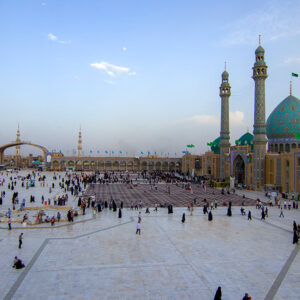وَلَئِنْ أَخَّرْنَا عَنْهُمُ الْعَذَابَ إِلَى أُمَّةٍ مَّعْدُودَةٍ لَّيَقُولُنَّ مَا يَحْبِسُهُ أَلاَ يَوْمَ يَأْتِيهِمْ
لَيْسَ مَصْرُوفًا عَنْهُمْ وَحَاقَ بِهِم مَّا كَانُواْ بِهِ يَسْتَهْزِؤُونَ
“And if We hold back the torment from them until (comes) a reckoned nation, they will surely say: ‘What withholds him?’ Beware, on the day when it comes to them, it shall not be turned away from them and that which they used to scoff at will surround them”
Imam Sadiq (as) said, “Torment” in this verse refers to the rising of the Qaem (as), and the “reckoned nation” refers to his companions who are equal to the number of companions of the Battle of Badr. (Al Ghaybah by Nomani page 127)
Ameerul Momeneen (as) said, “The reckoned nation” in this verse refers to the companions of the Qaem (as) who are a little over three hundred and ten men. (Tafseer Al Qummi volume 1 page 323)
Regarding the verse, “Hasten then to do good works…”(Chapter 2, verse 148), Imam Baqir (as) said, “Good works” refers to believing in the Wilayat, and “wherever you are, Allah will bring you all together” (Chapter 2, verse 148) refers to the companions of the Qaem (as) who are a little over three hundred and ten men. I swear to Allah that they are the “the reckoned nation” who will unite within one hour, just like the cumulus clouds of autumn. (Al Kafi)
Imam Baqir (as) said, I swear to Allah that it is as if I can see the Qaem (as) with his back resting on Hajar, calling out,
O people! Those who dispute with me about Allah, (should know) that I am the most knowledgeable about Allah.
O people! Those who dispute with me about Adam, (should know) that I am the most knowledgeable about Adam (as).
O people! Those who dispute with me about Nuh, (should know) that I am the most knowledgeable about Nuh (as).
O people! Those who dispute with me about Ibrahim, (should know) that I am the most knowledgeable about Ibrahim (as).
O people! Those who dispute with me about Musa, (should know) that I am the most knowledgeable about Musa (as).
O people! Those who dispute with me about Isa, (should know) that I am the most knowledgeable about lsa (as).
O people! Those who dispute with me about the Messenger of Allah, Mohammed (sawa), (should know) that I am the most knowledgeable about the Messenger of Allah (sawa).
O people! Those who dispute with me about the Book of Allah, (should know) that I am the most knowledgeable about the Book of Allah.
Then he will move to the Maqaam where he will perform two units of prayer and will ask Allah to grant him his rights.
Imam (as) added, I swear to Allah that he (Imam Mahdi (as)) is the “distressed” to whom this verse refers, “Is not He (best) who answers the distressed when he calls to Him, and removes the distress and makes you the successors in the earth” (Chapter 27 verse 62).
Jibraeel will be the first to pay allegiance to him and then the three hundred and thirteen men.
Those (from among the three hundred and thirteen) who meet (the Qaem (as)) on his way to Makkah, will join him. Those who do not join him on his way, will disappear from their beds. They are those to whom the Commander of the Believers (as) refers as “the missing ones from their beds.”
Allah says in His Book, “Hasten then to do good works (surpassing each other). Wherever you are, Allah will bring you all together” (Chapter 2 verse 148). “Good works” means (believing in the) Wilayat.
In another verse, Allah says, “And if We hold back the torment from them until (comes) a reckoned nation”. “The reckoned nation” refers to the companions of the Qaem (as) who will be united with him within one hour.
When the Qaem (as) reaches Bayza, the army of Sufyani will rise against him but Allah will order the earth to seize them by their feet. This is the meaning of the verse, “If you could see when they shall be terrified; but there shall be no escape, and they shall be seized from a nearby place” (Chapter 34 verse 51)
When this happens, (the army of Sufyani) will say, “We believe in him” (Chapter 34 verse 52).
Imam (as) added, “How can they come to belief from a place so far away?” (Chapter 34 verse 52).
“A gulf shall be created between them and that which they will eagerly desire, as was done in the past for the likes of them” (Chapter 34 verse 54). That which they will eagerly desire is not to be tormented. (Tafseer Al Qummi, volume 2, page 205)
- Read More: Mahdi in the Quran









